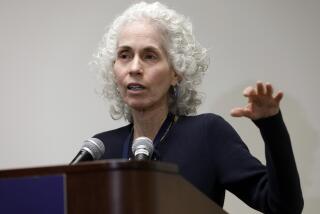Agency orders Blue Cross to drop demand
The state stepped into a bitter battle Thursday between Blue Cross of California and the doctors, hospitals and medical labs that serve about 700,000 people covered by the stateâs largest health plan.
At issue is the contentious financial relationship between medical providers and Blue Cross, which the stateâs top HMO regulator warned might worsen the plight of Californiaâs struggling hospitals.
The dispute began this year when Blue Cross sought to require hospitals, physicians and labs to sign a confidentiality agreement that would prevent them from publicly discussing fee negotiations.
But the providers balked, saying it prevented them from using lawyers and other outside consultants to represent them in fee negotiations, a routine practice.
If they refuse to go along with the rules Blue Cross lays down for the negotiations, the providers say, the health plan threatens to stop sending them patients.
On Thursday, the Department of Managed Health Care issued a cease-and-desist order forbidding Blue Cross to continue its efforts.
Blue Cross said it had tried to address the agencyâs concerns and was surprised by the action. The company, owned by Indianapolis-based WellPoint Inc., said its negotiating tactics were nothing new and were aimed at holding down medical costs.
WellPoint spokeswoman Shannon Troughton disputed the assertion that the confidentiality agreements limited providersâ ability to use consultants.
âInstead, what it does is provide protection of confidential information and bars consultants from sharing Blue Cross data with other providers and competitors,â she said.
Troughton said the company had used the agreements since 2002, and other health plans used similar policies.
She also disputed the departmentâs assertion that the confidentiality agreements could lead to contract terminations.
âState law requires that we routinely notify the department of contracts we are currently negotiating and potential termination dates,â Troughton said. âHowever, itâs important to note, in the last year only two out of 380 hospitals in our commercial division have terminated their contract.â
The agency issued the order after several hospitals said they were prepared to stop doing business with Blue Cross when their contracts expired rather than negotiate new rates without professional representation. Sixteen of those hospitals had contracts set to expire by year-end.
If all of the contracts expired, nearly 700,000 Blue Cross patients statewide would be forced to find new hospitals for elective treatments such as scheduled surgeries, the department said.
Because Blue Cross is the largest insurer in the state, the loss of its patients would put a financial strain on many hospitals, particularly stand-alone and rural hospitals.
âWe donât like unfair bargaining any place we find it,â said Cindy Ehnes, director of the Department of Managed Health Care. âBut here it is a tremendous concern about the financial viability of some of our smaller rural and stand-alone hospitals. That was very much on my mind.â
Ehnes said she was particularly concerned about the effect in the Los Angeles area, where financial troubles forced Brotman Medical Center in Culver City to file for bankruptcy protection last week and the sale of Centinela hospital in Inglewood, which was announced Wednesday.
âCentinela is a great example of where we have some hospitals that are potentially seriously at risk,â Ehnes said. âWe simply canât have a one-sided, take-it-or-leave-it bargaining agreement.â
Santiago Munoz, associate vice president for clinical services in the UC Office of the President, said one UCLA Medical Center contract already had been lost as a result of the dispute.
He said UCLAâs contract with Blue Cross for its area Medi-Cal patients expired in April and was not renewed because the university refused to negotiate under the terms demanded.
âItâs completely one-sided,â Munoz said. âItâs a business tactic that has to be scrutinized.â
He said he was pleased Ehnes and the department intervened and were concerned about the potential for the disruption of care on a wide scale.
Although UCLAâs Medi-Cal contract with Blue Cross affected 4,500 area patients, its commercial contract with the health plan covers 15,000 people who obtain healthcare through their employers or buy it on their own. That contract is up for renewal in January, Munoz said.
Whether it is renewed âdepends on how Blue Cross wants to proceed,â he said.
Francisco Silva, a legislative advocate for the California Medical Assn., said the physiciansâ organization was disappointed that the order failed to address contracts that already had been signed by providers.
âWe were hoping for something broader,â he said of the order. âWhile it clearly indicates that the confidentiality agreement in the contracts was illegal, it did not go back and declare the existing contracts void.â
Silva said he believed hundreds of physicians had signed contracts that they negotiated on their own because they felt they had no choice. âFor some of these physicians, particularly if they are small offices, they donât have the ability to negotiate with the most powerful insurance company in the state,â he said.
Silva and Daron Tooch, a Los Angeles lawyer who represents providers, said the agreements put hospitals in an unfair bargaining position by denying them information and expertise about the marketplace.
âThereâs no similar requirement on the part of health plans,â Tooch said.
âThey use the information they have from one hospital to negotiate with another hospital. Itâs really one-sided.â
--
More to Read
Get the L.A. Times Politics newsletter
Deeply reported insights into legislation, politics and policy from Sacramento, Washington and beyond. In your inbox three times per week.
You may occasionally receive promotional content from the Los Angeles Times.











